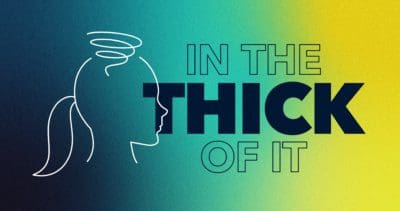
This post is by BAMRbassador Kate Walton, a partner in a government relations firm, is a mom of two + a step-mom of two. Kate wrote about the lead-up to having a hysterectomy in early October. Here she is again with an update on her recovery.
Three weeks after a total hysterectomy I was driving to work, fighting back tears—I couldn’t begin to tell you why.
My physical recovery from the surgery was better than I could have ever predicted. With my doctor’s encouragement, I was out for a walk 36 hours following the procedure, and over the following weeks, I was doing Pilates, light core work, and walking nearly every day. I was back to work part time in less than a week. On the outside, I felt like an A+ surgical patient—“look at how great I’m doing!”

The road to recovery is slow but steady
Emotionally, it was a different story. On any given day, my inner dialogue ranged from mild despair to outright sadness. I was physically tired and emotionally fragile.
Resources for hysterectomy recovery, including from my own health care provider, are wide ranging and at times downright patronizing. No, WebMD, I do not grieve the loss of my uterus. No, I am not struggling with “life’s transitions.” For a while now, I’ve been managing my life while also managing pain, discomfort, unpredictable bleeding, and numerous medical appointments caused by said-uterus—I am glad to part ways with it.
In all the ways that matter most to me, I am in the best part of my life. I have a loving and supportive marriage, a successful career, thriving children, close friends. Ups and downs, stresses, disappointments, sure, but nothing that would cause me to be near tears in the grocery store on a Tuesday afternoon.
It was clear the abrupt hormonal shift, coupled with depleted physical reserves, was making it hard to fully recover from surgery. After a follow-up medical appointment and a venting session with some close friends, I realized feeling better was going to require action and self-advocacy from me.
My health care provider cleared me for all physical activity—yet getting started again, I felt defeated by how quickly my strength and endurance dwindled.
I have found a lot of value in the work of Dr. Stacy Sims, specifically her research around nutrition, supplements, and training for menopausal athletes. Knowing the physical and mental health benefits of lifting heavy, I started picking up weights again. Less heavy than where I was two months ago, but heavy for me now.
I know when I tighten up my nutrition—take in more protein and fiber, consume less sugar—I feel better. So I try to be more intentional with those nutritional tent poles.
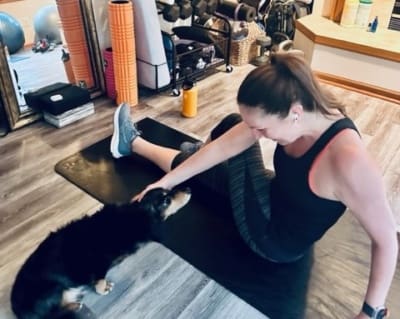
Strength workouts supplemented with love from her dachshund, Pan
I started adding running intervals into my walks and was pretty quickly able to run my usual three-mile route, albeit more slowly, but running the entire way.
When I am feeling sad or discouraged, I do a little inventory: Have I had enough rest? Enough water? Would some nice lip balm help?
To support it all, I am taking prescribed oral estrogen, which is helping to smooth out hormonal fluctuations, allowing these other strategies some more room to work.
My life is not a before-and-after movie montage. Yet after a month of putting these pieces in place, the clouds have decidedly parted, and I am feeling much more myself.
Next big step? Last week I signed up to run Grandma’s Marathon in June. I last ran that race 10 years ago, and it’s the site of my 26.2 PR. When I start training with a Train Like a Mother Club Heart and Sole program, I’m leaving space for new goals for this decade’s older, more-experienced version of Kate—I’m minus a uterus, yet I’ve gained so much.


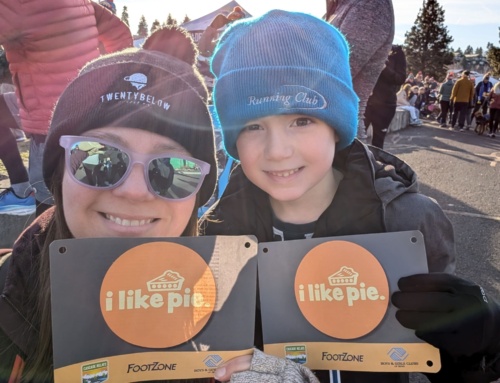
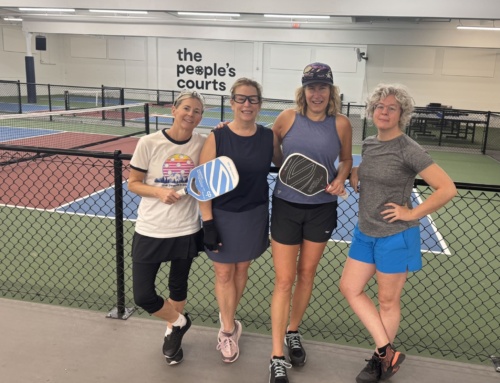
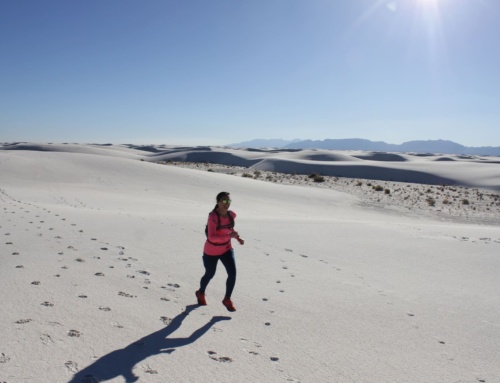
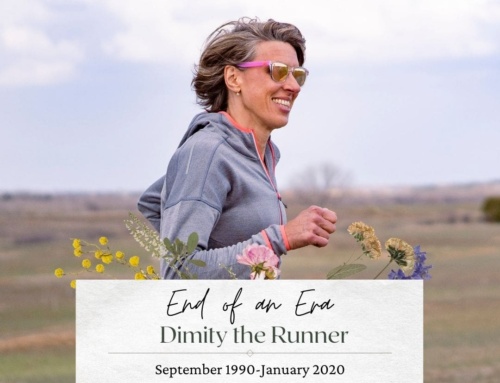
Thank you for this. I go in tomorrow for a hysterectomy and 2 weeks later for a ‘percutaneous tenotomy of the abductor tendons’ to deal with tendinosis of my gluteal medious/minimus. I haven’t REALLY run in 2 years and I am so ready, but also nervous it won’t ever happen again. I look forward to Kate continuing to tell her story.